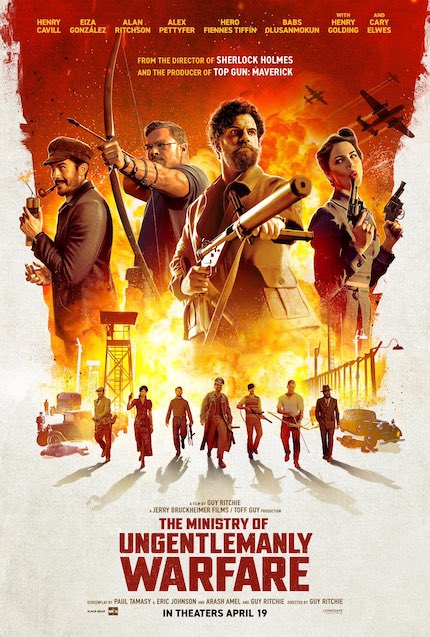THE MINISTRY OF UNGENTLEMANLY WARFARE Review: Real-Life WWII Superspies Get the Guy Ritchie Treatment

With three films in four years, Guy Ritchie (Guy Ritchie’s The Covenant, Operation Fortune: Ruse de Guerre, The Wrath of Man) has proven himself nothing if not prolific, specifically of broadly appealing, easily digestible, ultimately forgettable entertainments.
As surface-deep as they are hyper-stylish, Ritchie’s entertainments recall the vast majority of old-school Hollywood’s output: rarely intended to provoke or engage on a cerebral level, admirable for delivering crowd-pleasing moments amidst polished production values, male leads outfitted in varying levels of eye-massaging sartorial splendor, and ruthlessly economical storytelling that never overstays its welcome.
Ritchie’s latest film, The Ministry of Ungentlemanly Warfare, centers on the real-life, highly fictionalized commando group of the title, led by Gus March-Phillips (Henry Cavill), a rogue’s rogue with an anti-authoritarian bent that’s led to wartime incarceration rather than service for the British Empire during World War II. His very special set of Bond-level skills, however, make him the perfect candidate to lead a mission just on the right side of impossible: infiltrating a not-so-secret Nazi-controlled island, Fernando Po, off the coast of West Africa, with his tight-knit crew of unsanctioned saboteurs and destroy an Italian merchant vessel, the Duchessa d’Aosta.
The Ministry of Ungentlemanly Warfare’s opens not with March-Phillips's release from gaol and subsequent super-secret assignment for Winston Churchill’s (Rory Kinnear, Men) wartime government, but closer to the middle or even the end as March-Phillips and companion commandos Anders Lassen (Alan Ritchson, Reacher), a giant-sized Swede with a Nazi-killing fetish, Freddy Alvarez (Henry Golding), the team’s explosive expert, and Henry Hayes (Hero Fiennes Tiffin), sailor extraordinaire and de facto captain of the trawler they’ve sailed into Nazi-controlled waters. (A fifth member, Geoffrey Appleyard (Alex Pettyfer), the team’s master planner, awaits rescue from ill-fated imprisonment by those same Nazis.)
Besides introducing the audience to the core team, the opening scene sets a tone that’s both R-rated in its depiction of violence and brutality and practically weightless in its effects or consequences. Not counting a soon-to-expire dour Nazi officer with a few lines of dialogue, the Nazi sailors expire with videogame-inspired efficiency.
Neither March-Phillips nor the more physically oriented Lassen breaks anything approximating a sweat (though Lassen, an obvious fan of close-quarters combat, gets splattered in blood), an early, clear sign that the obstacles facing March-Phillips, while large in number if not variety, won’t be obstacles for long.
Another parallel storyline focuses on Heron (Babs Olusanmokun), a black market dealer and nightclub owner, and Marjorie Stewart (Eiza González), a Mata Hari-style undercover operative, working on Fernando Po to gather recon and in Stewart’s case, seducing a sadomasochistic Nazi officer, Heinrich Luhr (Til Schweiger), who commands the Nazi outpost on the island. As Heron gathers men and resources to aid in the British cause, Stewart engages in an increasingly dangerous game with the paranoid Luhr who suspects (rightly) that Stewart isn’t what she appears, a black marketer like Heron, but something far, far worse in his eyes: Jewish.
Only the Heron-Stewart storyline contains anything approaching suspense, due mostly to Stewart’s vulnerability (she’s often alone without the possibility of timely assistance) and the automatic tension implicit in her real identity as a British spy. While it’s certainly not the fault of a talented cast who clearly understood the assignment, the Stewart-Luhr scenes begin to take on a sense of deja vu that audiences won’t be able to shake, the result of Ritchie and his screenwriting associates cribbing from Quentin Tarantino’s Inglourious Basterds one too many times.
The comparisons to Inglourious Basterds don’t end there. It’s just as obvious, though, that Ritchie went further back in time, specifically The Dirty Dozen, The Guns of Navarone, and, of course, Ian Fleming’s James Bond novels (a naval intelligence officer during the war, a twenty-something, fresh-faced Fleming appears here in a handful of scenes). While Inglourious Basterds had Tarantino’s outsized gift for dialogue, scene construction, and a revisionist approach to WWII history that tipped his film into fantasy, Ritchie doesn’t, though turning March-Phillips into Terminator-type killing machines gets him close.
Originality, though, has never been one of Ritchie’s strengths as a filmmaker. Remixing, recontextualizing, and modernizing have been. He’s always preferred to pilfer the best elements from relevant sources (selectively) or techniques from the masters of the filmmaking game. High style and a comic-absurdist tone have been his strengths.
Both style and tone are in overabundance here, as is the ultimate crowd-pleasing instrument in a filmmaker’s toolbox set during WWII: dispatching Nazis by any and all measures necessary and unnecessary. Sometimes, seeing Nazis die in a hundred different ways is enough to cover the price of admission. The Ministry of Ungentlemanly Warfare just might be one of those times.
The Ministry of Ungentlemanly Warfare opens today (Friday, April 19), via Lionsgate.
The Ministry of Ungentlemanly Warfare
Director(s)
- Guy Ritchie
Writer(s)
- Paul Tamasy
- Eric Johnson
- Arash Amel
Cast
- Henry Cavill
- Alan Ritchson
- Alex Pettyfer







